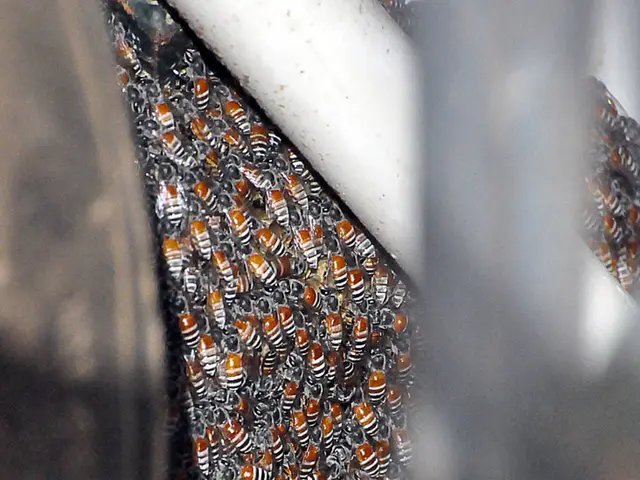Child Ailments and Immunization: A Crucial Discussion on Preventive Health Measures
Childhood Health Matters: Protect Your Kid with Vaccines
Let's talk about childhood illnesses. They can range from mild to severe and may impact a child's life for years. However, the good news is that many of these diseases can be prevented through vaccination!
The Power of Vaccination
Vaccines are like little superheroes, fighting against diseases by boosting our immune system. They work by introducing a harmless or weakened version of a germ into the body. This triggers the immune system to produce antibodies, giving lifelong protection against the disease.
Vaccines have been proven to be reliable and safe, helping kids avoid severe illnesses such as measles, mumps, rubella, polio, diphtheria, tetanus, pertussis, and many more. By getting our kids vaccinated, we can drastically reduce the spread of these diseases and protect them from serious complications.
Common Childhood Illnesses and Vaccines
Here's a snapshot of some common diseases that vaccines help fight and their potential severe consequences:
Measles
This highly contagious viral infection can cause fever, rash, cough, and red, watery eyes. If left untreated, it might lead to pneumonia, encephalitis, and even death.
Mumps
Mumps is another viral infection, causing swelling of the salivary glands. It can lead to fever, headache, muscle aches, and swelling of the jaw. In some cases, it may result in complications like meningitis, encephalitis, and infertility.
Rubella (German Measles)
Rubella can cause a rash, mild fever, and swollen lymph nodes. For pregnant women, it can lead to birth defects or developmental disabilities in the baby.
Polio
Polio mainly affects young children, causing paralysis, muscle weakness, and, in severe cases, respiratory failure. Thanks to vaccination, we've successfully eradicated polio in many parts of the world!
Diphtheria
Diphtheria is a bacterial infection that can affect the throat and nose, causing a thick, gray coating, difficulty breathing, and swollen glands. If left untreated, it can lead to heart and nerve damage.
Tetanus (Lockjaw)
Tetanus causes muscle stiffness, spasms, and difficulty swallowing – often as a result of a deep puncture wound or cut. It can be life-threatening if not treated.
Pertussis (Whooping Cough)
Pertussis is a highly contagious bacterial infection that causes severe coughing fits. In infants, it can lead to pneumonia, brain damage, and even death.
All About Vaccine Safety
Vaccines undergo extensive testing and monitoring to ensure their safety and effectiveness. Typical side effects are minor and temporary, such as a sore arm or low-grade fever. Serious side effects are rare, and the benefits of getting vaccinated far outweigh the risks.
To ensure maximum protection, follow the recommended vaccination schedule. Most vaccines are given in multiple doses for long-lasting immunity. Keep your child's immunization records updated and consult with healthcare professionals for any concerns or questions.
Summing Up
Vaccines are a powerful defense against childhood diseases. By ensuring our kids get vaccinated, we can protect them from life-threatening illnesses and contribute to our community's overall health. So, let's embrace vaccines and raise healthy, happy kids!
*Here's a quick look at some common childhood diseases and their complications, as well as the vaccines that help guard against them:
- Diphtheria
- Vaccine: DTaP (diphtheria, tetanus, and pertussis)
- Complications: Heart failure, paralysis, and death
- Pertussis (Whooping Cough)
- Vaccine: DTaP
- Complications: Pneumonia, brain damage, and death
- Tetanus (Lockjaw)
- Vaccine: DTaP
- Complications: Respiratory failure, cardiac arrest, and death
- Polio
- Vaccine: Inactivated Poliovirus Vaccine (IPV)
- Complications: Paralysis, muscle weakness, and death
- Hepatitis B
- Vaccine: Hepatitis B Vaccine
- Complications: Chronic liver disease, liver cancer, and cirrhosis
- Haemophilus influenzae type b (Hib)
- Vaccine: Hib Vaccine
- Complications: Meningitis, epiglottitis, and septicemia
- Pneumococcal Disease
- Vaccine: Pneumococcal Conjugate Vaccine (PCV13)
- Complications: Bacteremia, meningitis, and death
- Rotavirus
- Vaccine: RotaTeq or Rotarix
- Complications: Severe dehydration, potentially life-threatening
- Measles
- Vaccine: MMR (measles, mumps, and rubella)
- Complications: Ear infections, pneumonia, encephalitis, and death
- Mumps
- Vaccine: MMR
- Complications: Deafness, orchitis (inflammation of the testicles), and pancreatitis
- Rubella (German Measles)
- Vaccine: MMR
- Complications: Congenital rubella syndrome if contracted during pregnancy
- Varicella (Chickenpox)
- Vaccine: Varicella Vaccine
- Complications: Bacterial infections, pneumonia, and encephalitis
- Respiratory Syncytial Virus (RSV)
- Vaccine/Prevention: RSV immunizations for high-risk infants
- Complications: Pneumonia, bronchiolitis, and potentially life-threatening in infants
By getting these vaccines, we can help maintain herd immunity and prevent outbreaks of these diseases in our communities.*
- Vaccines, often referred to as little superheroes, strengthen our immune system against diseases by introducing harmless or weakened versions of germs.
- These vaccines stimulate the production of antibodies, providing lifelong protection against diseases.
- Vaccines have significantly reduced the impact of severe illnesses like measles, mumps, rubella, polio, diphtheria, tetanus, pertussis, and many others.
- By getting our kids vaccinated, we can limit the spread of these diseases and protect them from their severe consequences.
- Measles, a highly contagious viral infection, can cause fever, rash, cough, and red, watery eyes. If left untreated, it might lead to pneumonia, encephalitis, and even death.
- Mumps, another viral infection, causes swelling of the salivary glands and can lead to complications like meningitis, encephalitis, and infertility.
- Rubella, also known as German measles, can cause a rash, mild fever, and swollen lymph nodes. For pregnant women, it can lead to birth defects or developmental disabilities in the baby.
- Polio mainly affects young children, causing paralysis, muscle weakness, and, in severe cases, respiratory failure. Thanks to vaccination, we've successfully eradicated polio in many parts of the world!
- Diphtheria is a bacterial infection that can affect the throat and nose, causing a thick, gray coating, difficulty breathing, and swollen glands. If left untreated, it can lead to heart and nerve damage.
- Tetanus causes muscle stiffness, spasms, and difficulty swallowing, often due to deep puncture wounds or cuts. It can be life-threatening if not treated.
- Pertussis, also known as whooping cough, causes severe coughing fits. In infants, it can lead to pneumonia, brain damage, and even death.
- Vaccines undergo extensive testing and monitoring to ensure their safety and effectiveness.
- Typical side effects of vaccines are minor and temporary, such as a sore arm or low-grade fever.
- Serious side effects are rare, and the benefits of getting vaccinated far outweigh the risks.
- To ensure maximum protection, follow the recommended vaccination schedule and keep your child's immunization records updated.
- By ensuring our kids get vaccinated, we can protect them from life-threatening illnesses and contribute to our community's overall health. Embrace vaccines and raise healthy, happy kids!
Children's health and wellness can also be protected through proper nutrition, fitness and exercise, mental health care, regular check-ups, eye, hearing, skin care, and management of medical conditions like chronic diseases, autoimmune disorders, neurological disorders, and skin conditions. Climate change, environmental science, and safe spaces in the workplace can also impact children's health. Parents play a crucial role in promoting health and wellness in their children, addressing issues like medication and medicare, vaccination records, and weight management. As children grow older, it's essential to provide education on sexual health, reproductive health, and various therapies and treatments for a wide range of health concerns, including cardiovascular health, aging, and women's health.








